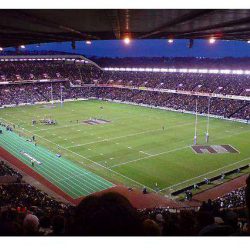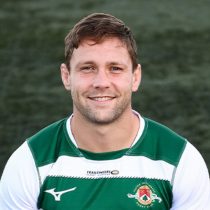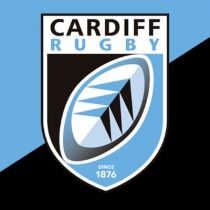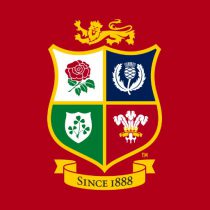Scotland's 1984 Grand Slam – Part one
- 3218

It’s perhaps little known, but Scotland won what could be considered de facto Grand Slams in 1933 and 1938. With France having been expelled from the Five Nations Championship after 1931 over murmurings of professionalism within an exclusively amateur sport, rugby’s flagship competition reverted to the Home Nations between 1932 and the resumption, post-war, of a full quintet of countries.
Those Triple Crown successes in ’33 and ’38 could be considered ‘Slams’, because Scotland beat England, Ireland and Wales, for a full house of victories; the same criteria that to this day represents the pinnacle in international rugby north of the Equator.
Irrespective of those championship titles, of the great Ian Smith captaining his country to the former, by 1984 Scotland had waited a relative eternity of 46 years for similar sweeps.
Shared championships had arrived in 1964 and then again in 1973, but it was high time Scotland matched the feat of the heroes of 1925’s Grand Slam, when the aforementioned Smith helped himself to no fewer than eight tries – a record that stands to this day.
LAYING FOUNDATIONS
Under the tutelage of Jim Telfer, Scotland went into the Five Nations in 1984 without real expectation. However, victory at Twickenham the year before, coupled with a memorable 25-25 draw with New Zealand a few months later, gave rise to the sort of cautious optimism that Scots are so familiar with each time the first weekend in February rolls around.
As part of our feature on Scotland Grand Slam of 1984, we sat down with three members of that heroic campaign: tighthead prop Iain Milne [IM], centre Euan Kennedy [EK] and back-row forward Jim Calder [JC], all of whom played significant roles in one of the country’s finest rugby hours.
Jim Calder, who played such a leading role in the latter stages in 1984, recalls touring New Zealand and how that laid the groundwork for what was to come: “Scotland had gone there in ’81, and talking of rucking, we found out quickly how tough it was to play against New Zealand teams.
“We knew the score from that tour, that we had to toughen up a bit in order to compete and do to them what they’d done to us. We’d had eight Scots on tour with the Lions as well that year, which also helped in educating how to win big games..
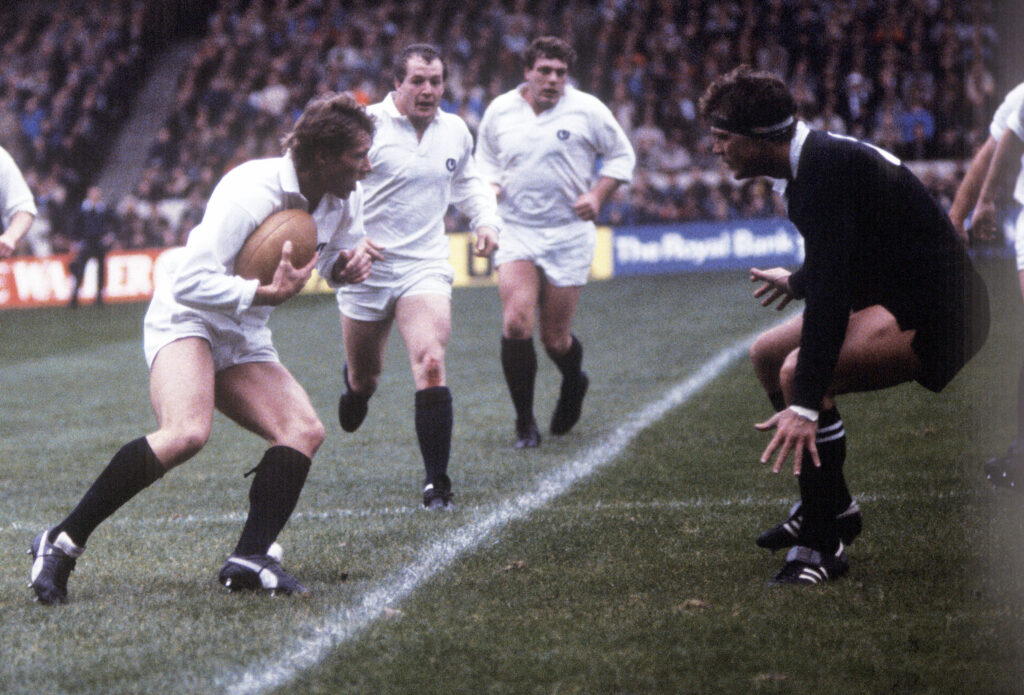
Pictured: John Rutherford in action against New Zealand in 1983. Fixtures against the All Blacks would help lay Scotland’s foundations for Grand Slam success.
“I remember Adam Robson, who was President at the time, getting us all together and saying ‘boys, I believe we’ll win the Grand Slam this year’, and we all thought he was mad.”
‘The Bear’, or Iain Milne for the avoidance of any doubt, explained why there was a bit of hope in the Murrayfield air 40 years ago: “I don’t think there were any thoughts of Triple Crowns or Grand Slams, to be honest. We knew we had quite a good team, building up with a win against England and drawing with the All Blacks; actually if you look through that period of time, from 1982 to 1987, we hardly lost a game by more than a score.
“I actually think we might have slightly underperformed or been unlucky that certainly in 1986 we didn’t win more Triple Crowns or Grand Slams..”
Backing up his team-mates’ claims that learning from the All Blacks played a part in Scotland’s halcyon period, Euan Kennedy, who debuted in that 25 apiece thriller, added: “It was my first cap and that came off the back of captaining Edinburgh against them 10 days before. New Zealand were the best rucking nation in the world and it was certainly a rucking game back then. I remember coming back after that game and taking my shirt off and I was just covered in aluminium stud marks.”
With Jim Telfer’s tunnel vision approach to training, which largely entailed “three hours on a Sunday of doing just that”, Scotland had a style of play that they thought would give them parity, at the very least, against some of the more fancied opposition.
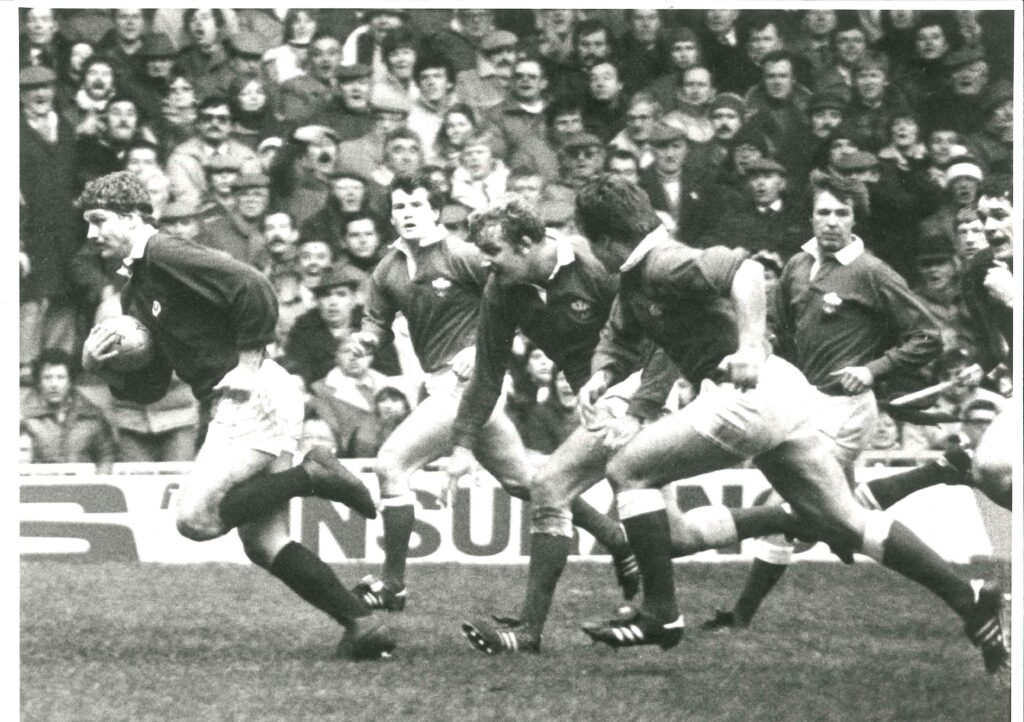
Pictured: Iain Paxton racing home for Scotland opening try of what would turn out to be one of their finest campaigns.
CARDIFF FOR STARTERS
Although Scotland had won 34-18 in Cardiff in 1982 (five tries no less, through Calder, David Johnston, Jim Pollock, Jim Renwick and Derek White), Wales had a formidable home record that, in the 1970s, frightened the life out of opposing teams.
A tough opening game, but where better to get what would be a memorable campaign off to the perfect start?
The rampaging no 8 Iain Paxton put Scotland into the lead, finishing off a clever move that started with a tap penalty 30 metres out and ended with David Leslie putting his back-row mate in for an easy try, which was converted by Peter Dods.
Worth mentioning that Dods, unerring from the tee, scored 46 of Scotland’s 86 points in the championship, his near-flawless boot contributing so much to the cause.
Wales hit back through a Mark Titley try to lead 9-6, only for Dods to respond with a penalty to edge his side in front once more. When captain Jim Aitken barrelled over for a try after a scrappy line-out (weren’t they all back then?), the 15-6 scoreline would take the Scots home.
(IM): “Going down to Wales for that first game, getting a win was so crucial. We beat them in ’82 which was the first time in Cardiff in 20 years, so to do it again two years later and control the game was excellent. We defended really well for the last few minutes because they were camped on our line and could have scored a try which could have brought them level and blown the whole thing before it even started.”
(EK): “For me personally, having watched the great Welsh teams of the 1970s, getting the chance to run out at Cardiff Arms Park was almost as big a dream as running out at Murrayfield.
“But running out and winning the game at Cardiff Arms Park was just unbelievable. I was 29, so I was getting on a bit, but not as much as my opposite number, Bob Ackerman indicated. Every time he tackled me that day and used me as a pushing post to get back onto his feet, he would say “you alright, Grandad?!” and he did that all afternoon!
“But what a noise in the stadium, and they still had the expectation from the 70s to match, so the longer the game went on the more confidence we got to do the job and so it proved.”
IM: “He [Peter Dods] was always very steady and he excelled himself that year, given the old ball and those conditions.
JC: “Yeah, he was brilliant, really.” EK: “He probably never got the plaudits he deserved. Peter was as good as Andy [Irvine] or Gavin [Hastings] for Scotland, I’m pretty sure.”
BACKING UP WITH THE CALCUTTA CUP
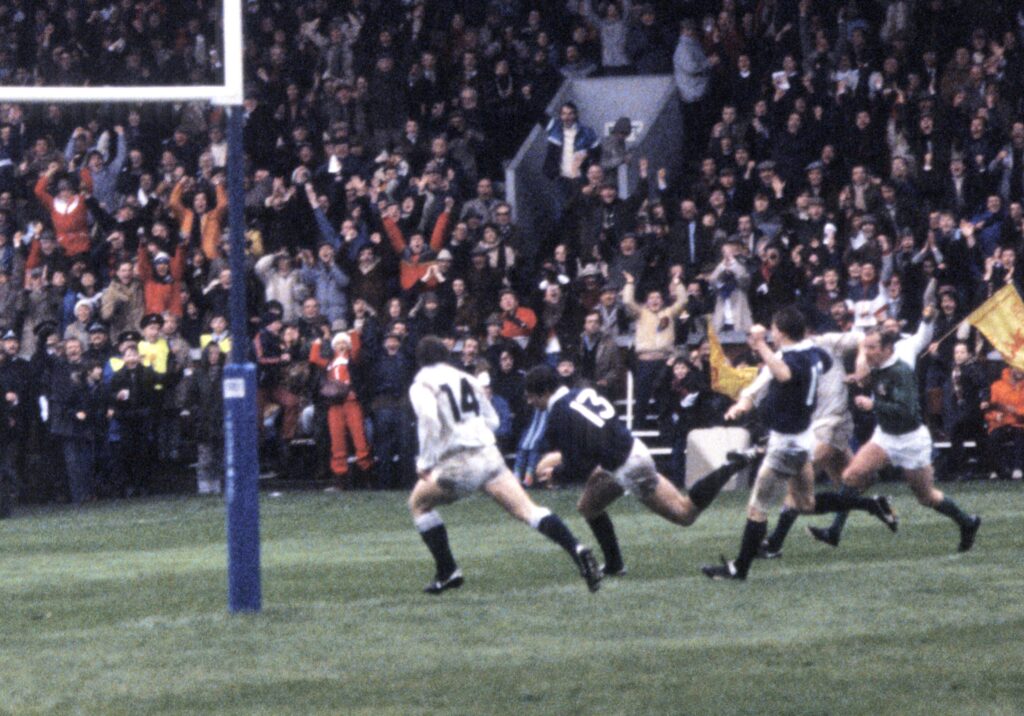
Pictured: The home fans raise their arms in celebration as Euan Kennedy (13) races through to score Scotland’s second try of the game.
To Murrayfield, then, and the cacophony of a crowd for whom beating England was almost a separate assignment to any designs of what was to come. That 22-12 win at Twickenham in 1983 had done little to temper Scottish expectations against an Auld Enemy who many believed were there for the taking.
IM: “We drew in 1982, beat them in 1983 at Twickenham, won in 1984 and 1986 – and in 1985 we were robbed, so it wasn’t that bad!”
David Johnston’s neat footwork, displaying all the skills associated with a former footballer, put Scotland into a dream lead with half an hour gone, before Euan Kennedy made it a double for the centre pairing with his first Scotland try in the second half.
EK: “Roy Laidlaw had put a high kick up and Dusty Hare let it bounce which as a full-back you’re told to get the ball before. Then Jim ripped the ball off him, gave it to Alan Tomes and we were on the offensive.
“Telfer got his tactics spot on with John Rutherford peppering Hare with kicks and us charging down after him. His goal-kicking that day was actually shocking compared to his normal high standards – I think he got two from eight and a lot of that was down to him being visibly shaken. Normally Dusty would have slotted at least half of those goals.”
With Peter Dods converting both tries, as well as slotting a couple of penalty goals, Scotland would retain the Calcutta Cup, a feat not achieved again until 2022.
IM: “We dominated England that day, John Rutherford was at his supreme best and controlled the game. We’d identified the English back-three as being a weakness and we really did a job on them.
JC: “Having toured with the Lions the year before with a number of the English boys, we knew their weaknesses and that was a huge confidence boost going into that one.
“We won well and it was rucking that beat them that day. Even Euan’s try, there was a superb bit of rucking in the lead-up to it, and that was all Telfer. He looked at the All Blacks and said ‘I want Scotland to ruck as well as they do’ and yeah, we were probably the second best team in the world at rucking by that stage.
“Scotland-England is always going to be a bit special, isn’t it? We knew if we moved Dusty about, that would be the route to victory. I didn’t realise he’d missed so many kicks, actually. At that point, England were not the strongest in the world, but it was a great result and the crowd played their part as ever.”
For all the joy at beating England in consecutive years, try-scorer Kennedy had his championship cut short by injury shortly after his magic moment.
EK: “It was elation and disappointment in one game. I was straight off to hospital as I’d ruptured a knee ligament, 15 minutes after I’d scored so I didn’t finish the game and then was out for the Triple Crown and Grand Slam matches.
“So I was in plaster for the dinner that night, but I still remember David Johnston and I holding the Calcutta Cup as the two try scorers that day, which was very special. I got rushed through A&E because maybe they knew I had the dinner to get to that night!”
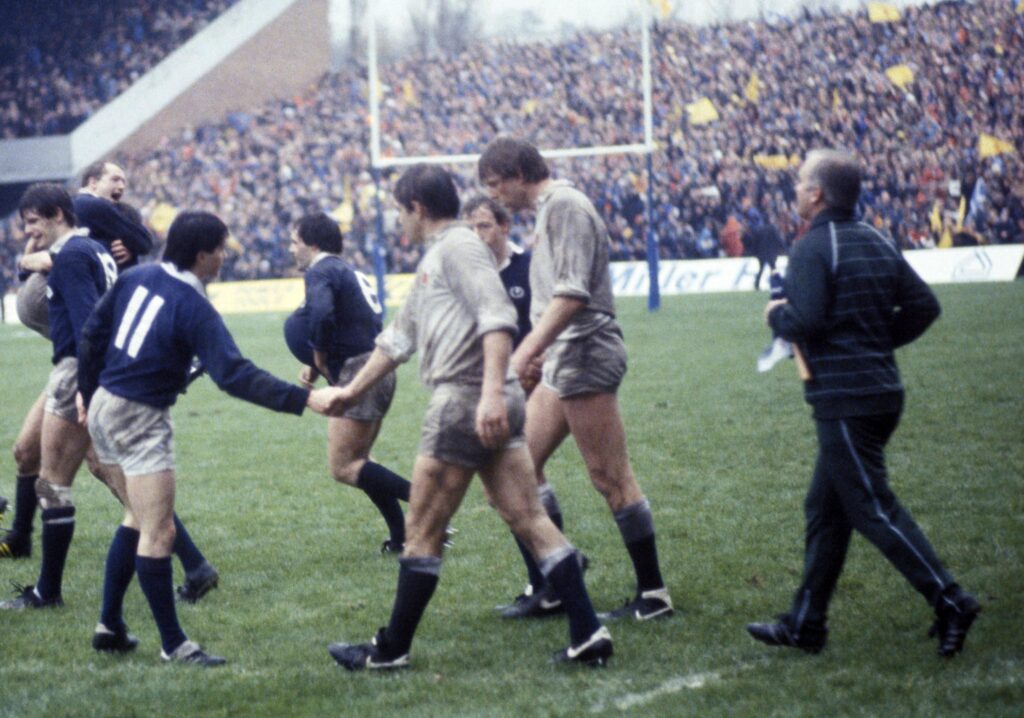
Pitcured: Scotland wing Roger Baird (11) exchanges handshakes with an England opponent after the final whistle.


